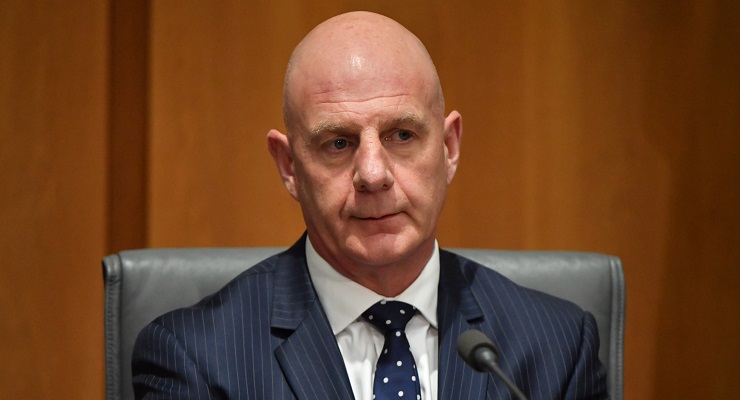
After calling an early election this morning for May 1, Tasmanian Premier Peter Gutwein now faces the challenge of leading the Liberal Party to a third successive victory — something it has never before accomplished in the historically Labor-dominated state.
Gutwein’s rationale for an election almost a year ahead of time is that Tasmania must be liberated from the fearful uncertainty of minority government, into which it was plunged on Monday when Liberal MP Sue Hickey responded to her effective disendorsement by quitting the party.
However, it’s hard to believe this consideration loomed larger in Gutwein’s thinking than a simple desire to cash in his government’s COVID-19 chips while they remain at peak value.
It would have taken a politician of rare principle to have done otherwise, because Tasmanian elections are particularly difficult for the Liberals to win.
Under its Hare-Clark electoral system, the state is divided into five electoral divisions that each return five members through proportional representation.
Unless the Liberals win at least three of the five seats in at least three of the five divisions, the best they can usually hope for is that the Greens will hold the balance of power, since no independent or other minor party has had a look-in since 1996.
Even with 51.1% of the statewide vote, the Liberals accomplished no more than a bare majority of 13 seats out of 25 when they were returned to power in 2018.
Little wonder then that Gutwein, who has had fully as good a pandemic as Jacinda Ardern and Mark McGowan, should choose to strike at a time when the iron is never going to be hotter.
Gutwein came to the job in succession to two-time election winner Will Hodgman on January 20 last year, just days before Wuhan was closed off by Chinese authorities and the first cases of COVID-19 began to be detected in other countries, including Australia.
When Newspoll gauged opinion on each of the state leaders that June, Gutwein scored an approval rating of 90% — two points higher than McGowan and around 20% clear of the best ratings recorded over the past year by other state leaders and the prime minister.
It was at around the time Newspoll did its work that Tasmania recorded what has so far been its last community case of the virus.
This success has been reflected in the Liberals’ ongoing dominance in the polls, the most recent of which had them leading Labor by 52% to 27%.
While it’s hard to see a government with such numbers being seriously threatened, Labor can at least be assured it will not suffer a disaster on the scale visited upon the Liberal opposition in Western Australia a fortnight ago.
The electoral system alone guarantees this, proportional representation being far less punitive on under-performing parties than the single-member model that prevails elsewhere.
However, Labor in Tasmania also goes into the campaign on a sounder footing: it has had four years of leadership stability behind the appealing Rebecca White, and made no attempt to put daylight between itself and the government on border restrictions, as the Liberals did to such disastrous effect in Western Australia.
There is also the federal dimension, which was an asset for McGowan but could potentially be a serious liability for Gutwein.
The Morrison government’s accumulating brand damage among women gained a local angle this week when Sue Hickey followed her resignation by claiming in parliament that Senator Eric Abetz, a figure of great influence in the state branch, had put it to her that Brittany Higgins was “disgustingly drunk” at the time of her alleged rape and would “sleep with anybody”.
The claim is denied by Abetz, but Gutwein has been telling in his determination to be seen to take it seriously.
However, Gutwein may himself be putting women off side through his determination to subject his Labor opponent to an unnecessary election campaign at a time when she will be six to seven months pregnant.
If so, this will hardly have been the first time an early election call proved to be less clever than the government imagined it was at the time.








Well, let’s hope this cynical bid is dealt the drubbing it deserves.
Wow – the libs are playing chess! Who figured? A pregnant opposition…Young women have other purposes – not the rough and tumble of unpredictable poli-tics. For that matter neither do older women who oppose a male. Disendorsed.
Hope the prick loses because that is all he deserves !
As a resident of Tasmania, there doesn’t appear to be much if any momentum for electoral change. Federal issues that are currently affecting the Liberals won’t play much of a role here either when votes are being cast in the ballot box. The current shortage of available housing and the cost of renting could bite the Premier and his party but his response to the Covid pandemic will see him through. My gut feeling is that the status quo will be maintained
After willy wonker hodgeman anyone looks good.
Hodgeman was elected because of brand recognition and boyish good looks.
He was minister for tourism so he only had good news to announce.
His media minders made sure the most difficult question he had to answer was what day of the week it was, which, to his credit he usually got right.
Gutwein is another kettle of fish entirely and is a shoe in for re election.
I normally wouldn’t give the liberals steam off my **** but if gutwein lives up to his promise of transparent political donations he would have my vote if I actually bothered to vote that is.
As it is he has been the gold standard in corona virus response no matter what bull****they say about the binchicken.
He’s still a liberal but should be the last up against the wall!